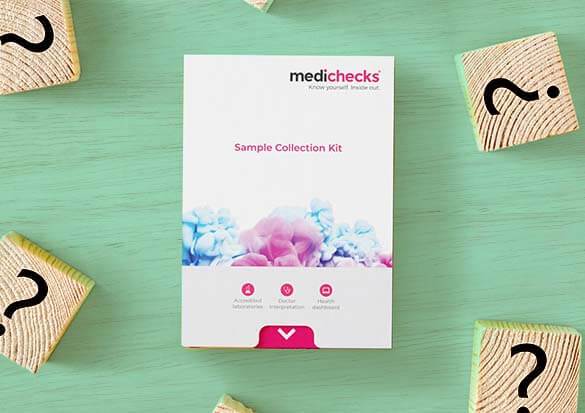How do you test for autoimmune disease?
Everything you need to know about autoimmune disease, including common types, symptoms, and risk factors.
Your immune system is your body’s defence against disease and infection. But autoimmune disease causes your immune system to attack healthy cells, mistaking them for harmful or foreign substances.
Types of autoimmune diseases, including type 1 diabetes and rheumatoid arthritis, are on the rise. According to a recent population-based study of 22 million people, they now affect one in ten people in the UK [1].
In this article, we look at symptoms, risk factors, testing, and treatment.
- What is autoimmune disease?
- What are the symptoms of autoimmune disease?
- What causes autoimmune disease?
- Does having one autoimmune disease lead to another?
- How is autoimmune disease diagnosed?
- What’s the treatment for autoimmune disease?
- How can I reduce my risk of autoimmune disease?
- Blood tests for autoimmune disease and ANA testing
What is autoimmune disease?
Autoimmune disease affects your immune system’s ability to tell the difference between healthy cells and harmful or foreign cells, like viruses and bacteria. This means that healthy cells can be perceived as threats, triggering an immune response. The immune system attacks healthy cells with fighter cells called autoantibodies.
It can help to think of your body as a castle and your immune system as an army that usually protects it from invasion. When you have an autoimmune disease, your army declares war on its castle.
What are the most common autoimmune diseases?
Researchers have identified more than 100 autoimmune diseases [2].
Common types include:
- Addison’s disease
- Coeliac disease
- Crohn’s disease
- Multiple sclerosis (MS)
- Pernicious anaemia
- Psoriasis
- Rheumatoid arthritis
- Type 1 diabetes
- Thyroid disease (Hashimoto's and Graves')
- Ulcerative colitis
The term autoimmune disease doesn’t refer to a single disease but covers a huge variety of diseases that can affect almost any part of our body.
Some affect specific parts of the body, such as:
- Coeliac disease — where the lining of the small intestine becomes inflamed.
- Multiple sclerosis — where the immune system attacks the nerve cells in the brain and spinal cord.
- Type 1 diabetes — which damages the pancreas.
Others, like systemic lupus erythematosus (SLE), affect almost the entire body, including the skin, heart, lungs, and kidneys. Like many autoimmune diseases, the cause of lupus is poorly understood, and diagnosis can sometimes be difficult.
Two of the most common thyroid diseases, Graves’ disease and Hashimoto’s thyroiditis, are caused by an autoimmune response. In Graves' disease, the immune system produces antibodies that cause the thyroid to produce excess hormones. In Hashimoto's thyroiditis, the body attacks the cells in the thyroid gland, decreasing the number of hormones produced.
What are the symptoms of autoimmune disease?
Some autoimmune conditions may share similar symptoms in the early stages. Symptoms of some conditions, like psoriasis or rheumatoid arthritis, often come and go. A period when symptoms worsen is known as a flare-up, while a period when symptoms reduce or go away is called remission.
More specific symptoms will depend on the exact condition. For example, Addison's disease can cause low mood, decreased appetite, and increased thirst. Common symptoms of Hashimoto's disease are weight gain, fatigue, and slow heart rate. Lupus can cause a characteristic butterfly-shaped rash over the cheeks and nose.
Common symptoms of autoimmune disease include:
- Fatigue
- Low-grade fever
- Muscle aches
- Joint pain and swelling
- Numbness and tingling in your hands and feet
- Hair loss
- Skin rashes

What causes autoimmune disease?
The exact cause of autoimmune disease is unknown. But some people are more likely to develop one than others.
Risk factors for autoimmune disease include:
- Being female — twice as many women as men have an autoimmune disease [3]. Lupus occurs primarily in women, particularly during childbearing years, and 90% of the people with lupus are female [4]. Although there’s no clear reason for this bias, it’s thought that female sex hormones play a part. Major hormonal changes, such as pregnancy, childbirth, and menopause, can affect the condition [3].
- Genetics — having a relative with an autoimmune disease can increase your risk and certain diseases. Lupus and MS tend to run in families. However, family members can be affected by different conditions. For example, one person may have type 1 diabetes, while a relative has rheumatoid arthritis.
- Environmental factors — exposure to ultraviolet radiation, organic solvents, and toxins like air pollution and cigarette smoke can all increase your chances.
- Being overweight or obese — obesity has been linked to several autoimmune diseases, including psoriasis and type 1 diabetes [5]. Although it’s not known exactly how excess weight is linked, it’s thought to create low-grade inflammation in the body that can affect immune function.
- Diet and lifestyle factors — smoking and a diet that’s high in saturated fats and ultra-processed food can increase your risk and worsen disease progression.
- Infections — the Epstein–Barr virus (EBV) is associated with rheumatoid arthritis and SLE [6]. COVID-19 infection has been reported to trigger cases of lupus, Guillain–Barre syndrome, and other diseases [7].
- Medications — certain blood pressure medications, statins, and antibiotics may trigger drug-induced autoimmune diseases such as lupus and autoimmune hepatitis [8].
- Having an autoimmune disease — around 25% of people with an autoimmune disease tend to develop additional autoimmune diseases [9].
Does having one autoimmune disease lead to another?
Having an autoimmune condition means you're more likely to develop another. The term for this is multiple autoimmune syndrome (MAS).
MAS is where a minimum of three distinct autoimmune diseases are diagnosed in one person. The MAS classification system can be helpful when trying to pinpoint a new autoimmune condition in a patient who has two previously diagnosed ones.
MAS has a three-group classification that clusters together conditions that tend to occur together:
- type 1 MAS
- type 2 MAS
- type 3 MAS
What causes MAS?
Several factors are thought to contribute to the development of MAS. These include environmental triggers, such as viral illness or prolonged exposure to certain toxic chemicals, as well as genetic factors.
So, while it isn't always the case, you can have more than one autoimmune disease.

How is autoimmune disease diagnosed?
It can be difficult to diagnose an autoimmune condition, especially in its early stages and if multiple organs or body systems are affected. Also, many conditions share similar symptoms with other diseases.
Autoimmune disease diagnosis methods include:
- Blood tests, including tests for antibodies that are attacking your own cells (autoantibodies)
- Medical history including any family history of autoimmune disease
- Physical examination
- Review of symptoms
Can an antinuclear antibody test diagnose an autoimmune condition?
The presence of autoantibodies in your blood isn’t enough to confirm a diagnosis, but it’s a start. Our Antinuclear Antibodies (ANA) Blood Test is a valuable first step if you have symptoms of lupus, rheumatoid arthritis, Sjogren’s syndrome, or a family history of autoimmune disease.
Dr Peter Prinsloo, Head of Clinical Governance at Medichecks, said:
“Autoantibodies are a good screening tool to see if something is wrong in those with symptoms, or to confirm certain diseases. But an absence of these antibodies does not necessarily exclude certain diseases, nor does the presence of antibodies necessarily confirm an autoimmune disease. This is often seen with thyroid disorders where a positive antibody result does not necessarily equate to abnormal thyroid function, and abnormal function is quite often seen without any detectable antibodies.”
What’s the treatment for autoimmune disease?
Although there’s no cure for an autoimmune condition, some of the symptoms can be well-managed with treatment. Many of these treatments aim to calm an overactive immune system.
Treatments include:
- Anti-inflammatory drugs
- Corticosteroids
- Drugs that suppress your immune system (immunosuppressants)
- Painkillers
- Physical therapy
- Surgery
- Treatment for a deficiency e.g. insulin injections for type 1 diabetes
How can I reduce my risk of autoimmune disease?
Some of the risk factors are outside your control, like being female. But there are steps you can take to help avoid the build-up of multiple risk factors.
If you have an autoimmune disease, these steps may also help improve your symptoms and could have a positive effect on disease progression and treatment.
Ways to reduce your risk of autoimmune disease:
- Avoid environmental toxins
- Get a good night’s sleep
- Eat a healthy diet — follow a nutrient-rich diet and limit processed foods. Reducing your intake of gluten, refined sugars, and dairy may be beneficial, as these foods can cause inflammation in the body and encourage flare-ups.
- Stay active — regular exercise also helps you maintain a healthy weight, which can reduce your risk.
- Stop smoking
Blood tests for autoimmune disease and ANA testing
A blood test alone cannot be used to diagnose an autoimmune condition. Still, it can indicate signs of one, such as the presence of thyroid antibodies in autoimmune thyroid disease. Blood tests can also be useful to monitor autoimmune disease and any treatment.
Related blood tests:
- Antinuclear Antibodies (ANA) Blood Test - check your ANA antibody levels which are often raised in conditions like lupus, rheumatoid arthritis, and Sjögren's syndrome.
- Autoantibodies Blood Tests - Profile 1: thyroid peroxidase, antinuclear, mitochondrial, smooth muscle, and gastric parietal cell. Profile 2: adrenal, gonadal, islet cell, gastric parietal cell and thyroid peroxidase antibodies.
- Advanced Thyroid Function Blood Test — this test includes thyroid hormones, thyroid antibodies, and nutritional markers that support thyroid function. It helps you explore whether thyroid-related symptoms such as fatigue and low energy could be caused by a micronutrient deficiency rather than a thyroid condition.
- Thyroid Function with Antibodies Blood Test — check if your thyroid hormone levels are within the normal range and indicate whether any abnormalities could be caused by an autoimmune disease. Even if your thyroid function is normal, elevated antibodies may increase your risk of developing a thyroid disorder in the future.
If you’re experiencing symptoms of an autoimmune disease or think you may be at increased risk, we recommend you talk to your doctor. As with all health concerns, it’s better to get support sooner rather than later. The ASA Foundation also provides advice and guidance if you’re concerned about autoimmune disease.
References
- Conrad, N. et al. (2023). Incidence, prevalence, and co-occurrence of autoimmune disorders over time and by age, sex, and socioeconomic status: a population-based cohort study of 22 million individuals in the UK. The Lancet, 401(10391), pp.1878-1890.
- Autoimmune Association (2023) Disease information. Available at: https://autoimmune.org/disease-information/ (Accessed: 18 December 2023).
- https://www.ncbi.nlm.nih.gov/pmc/articles/PMC7292717/
- Lupus UK (2023) The epidemiology of lupus. Available at: https://lupusuk.org.uk/medical/lupus-diagnosis-treatment/introduction-to-lupus/epidemiology-of-lupus/#:~:text=Gender,in%20predicting%20occurrence%20of%20lupus.
- https://pubmed.ncbi.nlm.nih.gov/27639922/ (Accessed: 18 December 2023).
- National Institutes of Health (2018). Epstein–Barr virus and autoimmune diseases. Available at: https://www.nih.gov/news-events/nih-research-matters/epstein-barr-virus-autoimmune-diseases (Accessed: 19 December 2023).
- Halpert, G. and Shoenfeld, Y. (2020). SARS-CoV-2, the autoimmune virus. Science Direct, 19(12), pp. https://www.sciencedirect.com/science/article/pii/S156899722030272X?via%3Dihub
- Castiella, A. et al. (2014). Drug-induced autoimmune liver disease: A diagnostic dilemma of an increasingly reported disease. https://www.ncbi.nlm.nih.gov/pmc/articles/PMC4009471/
- Cojocaru, M., Cojocaru, I. and Silosi, I. (2010). Multiple autoimmune syndrome. A Journal of Clinical Medicine, 5(2), pp.132-134.
Related tests
Our ANA blood test helps detect antibodies that may indicate autoimmune activity in the body
- Results estimated in 4 working days
- 1 biomarkers
Venous collection
Select testGet detailed insights into your thyroid function, including antibodies and nutrients essential for optimal thyroid health
- Results estimated in 2 working days
- 10 biomarkers
Finger-prick or Venous collection
Select testGet a comprehensive view of your thyroid health with this advanced test with antibodies
- Results estimated in 2 working days
- 5 biomarkers
Finger-prick or Venous collection
Select testThis test checks for specific antibodies linked to autoimmune conditions, offering valuable insights into your immune system’s activity
- Results estimated in 5 working days
- 6 biomarkers
Venous collection
Select testAre you experiencing unexplained symptoms such as fatigue, digestive issues, or weight changes? Our autoantibodies blood test investigates potential autoimmune conditions affecting the adrenal glands, thyroid, pancreas, ovaries, and stomach
- Results estimated in 10 working days
- 5 biomarkers
Venous collection
Select test




